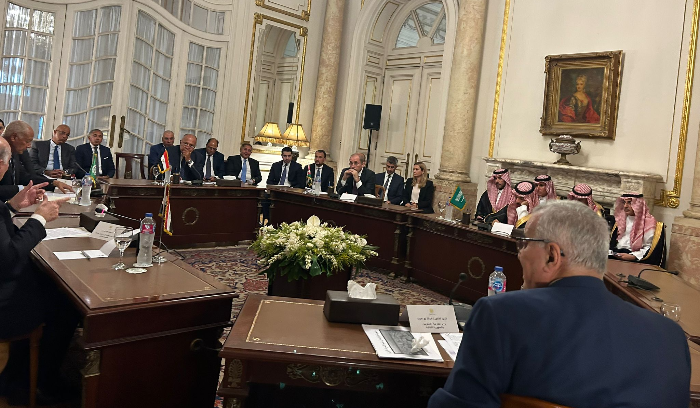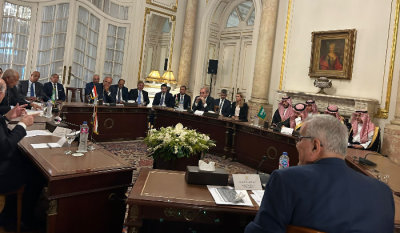Lebanon expressed its reservation on the term "voluntary return" of refugees, preferring to use the phrase "non-coercive return" during an Arab ministerial meeting regarding Syria. The meeting was attended by Abdullah Bou Habib, the Minister of Foreign Affairs and Emigrants in the caretaker government, along with foreign ministers from Egypt, Saudi Arabia, Jordan, Iraq, and Syria.
The participants discussed "developments in the situation in Syria and efforts to achieve a comprehensive settlement to the Syrian crisis," focusing on the issue of displaced Syrians and their return to their homes, as well as combating drug smuggling.
The attendees emphasized the importance of "following up on the implementation of the Amman Statement issued on May 1, 2023, and enhancing the leading Arab role in resolving the Syrian crisis, addressing its political, security, and humanitarian repercussions, and continuing dialogue to achieve this goal, in line with Security Council Resolution 2254, while preserving Syria's unity, integrity, and sovereignty, meeting the aspirations of its people, liberating it from terrorism, and contributing to enhancing suitable conditions for the voluntary and safe return of refugees as a humanitarian priority."
The ministers reiterated that "the only solution to the Syrian crisis is a political one," expressing their desire to resume work on the Syrian constitutional path and hold the next meeting of the Syrian Constitutional Committee in Oman, facilitated and coordinated with the United Nations before the end of this year.
The participants stated, "Confirming the necessity of intensifying efforts to alleviate the humanitarian suffering of the brotherly Syrian people and in the context of the international community's responsibility to fulfill its commitments in this regard," they welcomed the announcement by the United Nations and the Government of the Syrian Arab Republic regarding an agreement reached on August 7 to deliver humanitarian aid through the Bab al-Hawa crossing for six months. They also welcomed "the decision of the Syrian government to extend the opening of the Bab al-Salam and al-Rai crossings for humanitarian assistance."
The ministers expressed their "hope for the continuation of aid delivery to those in need and encouraged the Syrian government to consider extending the use of these crossings for further periods, in the interest of the Syrian people."
Regarding refugees, the ministers stressed the "necessity of resolving the crisis and its repercussions on the Syrian people and host countries, highlighting the importance of enhancing cooperation between the Syrian government and host countries to organize and facilitate the voluntary and safe return of refugees and end their suffering, in coordination with relevant United Nations agencies, primarily the UN High Commissioner for Refugees, according to applicable procedures and regulations, considering it a priority to be worked on."
The participants confirmed "intensifying efforts with the international community and the United Nations to accelerate the implementation of early recovery projects to expedite the return of refugees to their cities and villages, expanding the scope of humanitarian activities while building the necessary foundations for recovery."
The statement affirmed that "Syria continues to take and intensify measures aimed at the return of displaced persons, including facilitating the opening of more offices for the UN High Commissioner for Refugees in their return areas and regularly announcing the measures taken to facilitate this return, including incorporating them into presidential amnesty decrees."
It also emphasized "the ongoing regular announcement of data regarding the number of returning refugees and the Syrian government's commitment to maintaining constructive engagement with the Commissioner on their return issues."
The statement addressed the "necessity of supporting efforts to combat terrorism in Syria and called for intensifying cooperation between the Syrian government and concerned states and the United Nations, urging the international community to play an active role in eradicating this threat in all its forms, rooting out its sources, and supporting Syria and its institutions in their legitimate efforts to maintain the country's sovereignty and security and to end the presence of armed and terrorist groups on Syrian territory, and the withdrawal of all unlawful foreign forces, in accordance with international law and consistent with the United Nations Charter, which preserves the security of Syria and the region."
The participants agreed to "hold the next meeting of the Arab Contact Committee with the Syrian Minister of Foreign Affairs and Emigrants in Baghdad and to form a contact team at the expert level to follow up and prepare for it."




